by Peter Donovan
ENTERPRISE, OREGON--Human creativity, rather than natural resources or transportation, is now widely recognized as the fundamental driver of economic growth. However, as Richard Florida points out in The Rise of the Creative Class (Basic Books, 2002), economic development strategies are stuck in the past. In a world geared to the needs of institutions, entrepreneurial innovation collides daily with regulations, program requirements, and persistent beliefs that only big business counts. The risks entrepreneurs face, and the dedication required, may keep them in solitary confinement. Four out of five will fail.
In northeast Oregon, citizens in two rural counties have chosen to support the creativity of their people on its own terms. Wallowa and Baker counties each have formed a volunteer committee--more of an association than an institution--of thirty people committed to helping local entrepreneurs succeed. Each committee has raised funds and hired a facilitator or business coach, who provides free, confidential, and one-on-one business coaching, for as long as it takes, to anyone who is serious about pursuing an idea, whether they are an established business or just a person with a dream. In two years, these efforts have helped create 80 new jobs, 30 new businesses, and 20 business expansions.
Peter Donovan 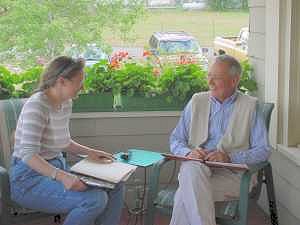 Heather Tyreman, owner of Bronze Antler Bed and Breakfast in Joseph, Oregon, consults about financial management with Wallowa County Business Facilitator Myron Kirkpatrick. |
They learned the method from Ernesto Sirolli, an Italian-born political scientist. As a young volunteer in Zambia in 1971, Sirolli realized that it was irresponsible, and deeply harmful, to try to turn hunter-gatherers into farmers. Though many development professionals have suspected as much, Sirolli grew obsessed with finding a successful alternative to top-down development schemes. In the 1980s, he put his radical, antidogmatic ideas to the test in rural Western Australia. Instead of trying to motivate people, or implement projects on behalf of those considered ignorant or helpless, Sirolli made himself available as business coach and advocate for anyone who was truly passionate about something.
By treating economic development as a byproduct of personal growth and self-actualization, Sirolli was able to make a quantum leap in the effectiveness of business coaching, as well as create local miracles of economic development. He has devoted himself since to teaching civic leaders how to turn the creativity, skills, and passions of local people into viable businesses. Beginning in the 1990s, communities in the Midwest, Canada, and now Oregon, Idaho, Montana, and California have responded to the challenge and promise of Enterprise Facilitation, as Sirolli calls his philosophy and method.
Northeast Oregon has depended on timber, ranching and agriculture, and tourism. In Wallowa County, employment in the timber industry is only a quarter of what it was as recently as 1990. People like to live here, but family-wage jobs are scarce, and local markets are limited. In winter, the unemployment rate is over 15 percent, often the state's highest. People aged 20-40 tend to leave, and the arrivals tend to be 45 and up, from more urban areas, and often with retirement money. The schools cut budgets and lay off staff. The service sector--motels, restaurants, healthcare, nonprofits--has grown, but not enough to match the shrinkage in timber jobs.
Recent economic development efforts in Wallowa County have focused on wood products, manufacturing, and tourism promotion. Jerry Perren, who directed the first county-wide chamber of commerce in 1979, says, "I've seen a lot of economic development efforts come and go. We haven't had a lot of success, except by accident, when the first bronze foundry came." Valley Bronze, which casts mainly western art sculpture using the lost wax process, located here because of scenery and quality of life issues. Artists and other foundries followed.
Pressures to recruit industry, reopen logging on Forest Service lands, and to promote tourism remain strong. But there are smoldering conflicts over economic development, gentrification, and social and cultural change.
Baker County has many of the same issues, though it has over twice the population and is less isolated. Strong local leadership has succeeded in recruiting some industry, the Oregon Trail Interpretive Center, and in implementing a major historic facelift downtown. But the downtown retail core has been struggling.
Baker Enterprise Growth Initiative (BEGIN)
In 1999, Ernesto Sirolli was invited to address groups of people in both counties. Baker City manager Gordon Zimmerman says that when he heard Sirolli outline his philosophy and method, "I just knew that it would work here." With Zimmerman as a catalyst, a group of civic leaders, activists, and business people coalesced around the idea and began to raise funds. For the price of paving three city blocks, about $180,000, Baker could fund a two-year trial by hiring a full-time facilitator, and getting training and guidance from the Sirolli Institute. Results from other Enterprise Facilitation efforts suggested the probability of helping create 20 new businesses during that period, with perhaps 40 jobs. Baker City and Baker County committed funds, followed by state and federal economic development agencies.
After a one-day training with Sirolli, the committee (which called itself BEGIN) began to recruit a facilitator--a mature person with broad experience in small business, a good listener and people person, who wanted to help people succeed on their own terms.
"We didn't advertise for an economic developer," says Nancy Peyron, who chairs the BEGIN committee. "We needed someone to help steer, not row the boat." They hired Ruth Townsend, a grandmother with a background in agricultural marketing.
As Sirolli's method differs considerably from more traditional economic development or business advice, Sirolli did a week-long training with ten committee members plus Ruth. "We've had enough people in the training to hold it, to keep the concepts," says Nancy Peyron.
Explains Ruth, who started meeting with interested local entrepreneurs in June 2000, "I coach. I prompt, empathize, teach, and support. I guide people through the myriad steps to starting a business. I tell them, I will get in the business boat with you, but I won't row. I don't motivate. If they don't call me back, I don't pursue them, no matter how much I want to." She works out of her home and car.
Peter Donovan 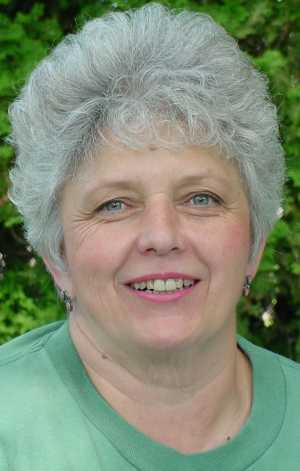 Ruth Townsend |
The BEGIN committee has about 30 people on it. They call themselves a board, but there are differences. "The board is loosely organized, self-selected, open, no limit, and not much voting," says Jennifer Watkins, a board member who works for Baker City in economic and community development. "Meetings are friendly and positive."
Says Nancy Peyron, "Some people shook out. We need experienced people and creative people. The folks on this board are local experts. Our brainstorming is very creative. How can a facilitator work without a board? She would be just another economic developer. We are the shadow consultants to Ruth, who is a consultant to her clients."
The BEGIN board does not engage much in policy decisions or debate, but acts as a live local network for the facilitator and the people who seek help. "The board is there to help people succeed," says Nancy. "Nobody has asked anybody to stop anything."
"There are a lot of really intelligent people who are willing to help," says Watkins. "Board members take the businesses personally, and support them. There's lots of volunteer time, service, and skills."
Sirolli tells board members that they must personally introduce the new facilitator to ten of their friends. Because everyone knows someone with an idea, inquiries start coming in. In accordance with Sirolli's model, Ruth asks for ideas and resources for the entrepreneurs she works with (called clients) at monthly board meetings, which are also bound by a confidentiality agreement.
"I was worried about confidentiality," says Nancy. "But there haven't been problems. People are holding this with respect. It is often said that 'the community eats its own.' But we aren't doing that."
Says board member Cheri Smith, who used to direct the Chamber of Commerce, "our board has been the effective unit in getting Ruth going. Most board members are well-connected and busy. They make the effort. Ruth will bring up a client and almost everybody talks. The meetings are fun because of the energy and intelligence, with a life of their own. Thirty heads are better than one. You can glean the right ideas from thirty people giving theirs."
Jean O'Brien: Arctic Fleece
Jean O'Brien was sewing and selling synthetic fleece garments. She wanted to open her own business, from her home, so that she could be with her children. She heard about Ruth Townsend from some friends who also had a business.
"She came out. We talked. She's really helped me a lot, seeing where I'm at now, and where I'd like to be. How to branch out and go to the next steps."
The expectation is common that sole proprietors or small partnerships can adequately fulfill the three functions needed in business: (1) production of the product or service, (2) financial management, and (3) marketing. What Sirolli discovered while coaching entrepreneurs was that most people will botch or procrastinate one of these crucial, but dissimilar, functions. For example, a store owner may have a wonderful product and know how to market it, but avoids dealing with pricing, cash flow, or inventory control. When things start to look grim, she will try to sell more because that is what she knows, not realizing that her problem is one of financial management.
Whether the business is Microsoft or a lemonade stand, successful entrepreneurship, says Sirolli, is built on teamwork--finding people who love to do what you hate. He trains facilitators and the boards that support them to diagnose businesses accordingly, and to insist on the point with the entrepreneurs. For those who cannot afford to hire the function that they care less about, there is always barter, or other arrangements.
Peter Donovan 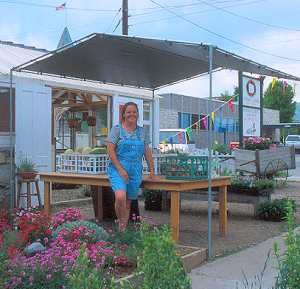 Jean O'Brien at the small greenhouse in front of her new house in Baker City, now home to Goose Creek Gardens and Produce as well as Arctic Fleece. |
Jean says, "Ruth talked about the three legs of business [production, marketing, and financial management]. I like to make and sell the product, and I decided not to try to do the financial. Now I have a bookkeeper, and I trade her jackets, and make stuff for her grandkids."
She designs and sews for her Arctic Fleece label--most of which she wholesales--and several people sew for her on a piecework or contract basis. Her husband does some of the pattern work. "It's grown pretty fast. I tend to want to just do it. Ruth has helped me pull back a little, and put the business into bite-sized chunks for me."
Ruth helped her with a business plan that got O'Brien a line of credit from a local credit union to buy materials and pay the people who sew for her. "It's people helping people. I think that's really important in a small community."
"It's a good life. I can be at home with my kids and be a support to my family. My business has done so much better because of Ruth." Business has doubled each year, from $6,000 in 1999 to $24,000 in 2001. In April 2002, the O'Briens bought a house in downtown Baker, along with a business called Goose Creek Gardens and Produce. People buy garden plants and produce in the summer, and fleece garments during the colder months.
Tami Waldron: Tami's Pine Valley Funeral Home
The town of Halfway, population 345, is an hour's drive on mountain roads from Baker. Tami Waldron worked at the local health clinic, and later became an EMT and ambulance crew member. After seeing how deaths were handled versus how she wanted them handled for families, she knew that she wanted to do her own funeral home. She apprenticed to a funeral home in Baker and got her director's license. How would she finance a startup funeral home in this little town?
Peter Donovan 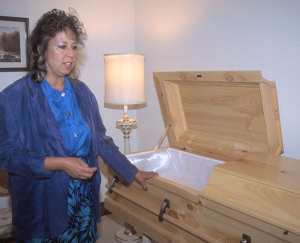 Tami shows a locally made pine casket. |
Marvin Burgraff, the mayor of Halfway and a BEGIN board member, recommended she see Ruth about getting funding. There were grants available, often for women in small business. Tami made 19 applications and all were turned down. "But Ruth and BEGIN were so encouraging, like a cheerleader squad. Ruth was willing to come to Halfway."
Comments Ruth, "the cool thing about her, she wanted to care for families, and she didn't want to gouge them." Tami worked as a firefighter to save money, and began acquiring used equipment--a 1969 side-loading Cadillac hearse, a cooler, furnishings for the sitting room. Tami's Pine Valley Funeral Home opened in April 2001 in a former office of Idaho Power Company on Halfway's main street--fifty years after the last funeral home in Halfway closed. She has no debt.
"It's a one-person operation. I take care of all of it, including the removals. I'll come to your house. Families love it that they know me." A young boy, at his grandfather's funeral, asked her to check to see if his picture was in his grandfather's jacket pocket as planned.
"I have the most unbelievable passion for funeral service. Most people don't have that, so I'm essential. I can't make the pain of death easier but I can make the journey of choices easier. I want every family to be treated perfectly every time. If I can make all those pieces fit together, it makes for positive grieving."
She has made the front window of the funeral parlor into a memory window, as a validation of life and showcase for mementos of the deceased--a rocking chair, photos, a fiddle, embroidery work. A light resembling a candle is on all night.
A funeral with her costs $3,000 or less. "I love that I can be in the comfort zone for cost. That was easier than I thought it was going to be."
A local cabinetmaker now makes pine caskets, the liners are sewed locally, and her printing is done locally too. With a local teamster, she offers a horse-drawn hearse service. Tami does about one funeral a month. She has the strong support of local business.
Tami is now on the BEGIN board, "which is really fun. I love that people have ideas."
Randall and Sharla Coots
Randall Coots worked at the prison in Baker. "My wife and I loved used books and wanted to open a used bookstore"--which Baker lacked. A co-worker gave him one of Ruth Townsend's business cards. "We met three times. She gave us all sorts of information. It was a huge help and it was all free."After finding figures and making projections, Randy and Sharla decided not to proceed. "Even with the most optimistic financial projections, it didn't look good." They would have had to remortgage their recently purchased house, and one of them would still have to work outside the bookstore.
"It is hard to find someone who's realistic," says Randy. "It's easy to find yea or nay opinions, but it's hard to find balanced opinions. We're grateful to Ruth, who helped us get some solid information. She was trustworthy and fair."
"It's easier to get into business than it is to stay in business. I know many people who had a small business briefly and are still paying the debt."
"If we hadn't given it a shot, we'd have always wondered." He wrote Ruth: "We want to thank you very much for your time and help. One of the reasons we feel no regret in our decision is because we made it with hard facts and good guidance."
For Townsend, "This job has been the most exciting thing, the most wonderful adventure of my life. Everything I've done has led me here. The honeymoon period hasn't ended yet. It's the most soul-satisfying thing in my life."
So far, only one of the businesses she has aided has more than three employees. Many are home-based, retail or wholesale, and 75 percent of her clients are female. "I would have love to have generated more jobs, but I think we're going to find more and more cottage-type businesses in the future," she says.
She points out that all medium and large businesses got their start as small ones. On September 10, 2001, Jean O'Brien of Arctic Fleece met with the Hanna Andersson company in Portland, which does a large mail-order business in children's clothing. They expressed interest in her hats and 10,000 reversible jackets per year, and stressed the need for O'Brien to move her production from people's homes to a small factory for quality-control reasons. After the events of September 11, the company put new vendors on hold, but O'Brien will be talking to them again.
Some "old guard" economic development people remain skeptical of BEGIN's successes, or don't believe that small businesses are significant or worth the effort. Some private businesses are reluctant to support the effort, fearing additional competition. "It's been a long hard fight to be recognized," observes Gordon Zimmerman.
"The impact is still in people's garages" notes Cheri Smith. "It's very subsurface right now. BEGIN has been able to give people who are just working at jobs the confidence that they can follow a dream. It improves the opportunities in this community--it has to do with the joy of creating something you can call your own. I'm thrilled that BEGIN is in Baker City. It outshines other economic development projects by far. It has kept people here who want to be here."
Cheri is now considering a business of her own, and is consulting Ruth. She has been able to consult with an attorney and financial person on BEGIN's board. "I've never thought of owning my own business but service on BEGIN has given me confidence. It's more personal. When you're working with people, you need personal. Traditional economic development has a place but it's far overadministered and it's not people-centered."
Jennifer Watkins observes, "we're starting to see more of our downtown retail businesses working with Ruth. It really has to be proven before they'll come in for help. It has spread a lot through word of mouth, and the newspapers. It's really nice to have someone to refer people to. Before BEGIN, there weren't a lot of resources for entrepreneurs."
Gordon Zimmerman summarizes the reasons for success. "There is no mold to force people into. There is no time frame but their own. There is no passion except what they possess. BEGIN is successful because it deals with developing the person, not just the business. It takes people where they are at, and challenges them to take small steps until a business whole is achieved--one that includes the people, the product, the marketing, and the money. It all begins with the person, and the steps are taken at the individual's pace."
Wallowa County Business Facilitation (WCBF)
In Wallowa County, as in Baker, both liberals and conservatives were drawn to Sirolli's method, which concentrated on free and individualized coaching for any entrepreneur who was serious enough to ask for it, rather than programs, planning, or large-scale projects. A six-month series of meetings helped evaluate the hazards and potentials, and people checked with other efforts in the Midwest and Canada.About 21 percent of Wallowa County's workforce was self-employed, about three times the national average. Responding and supporting individual creativity was a way to take responsibility for the future, ease conflicts over growth and development, and help create new economic activity in a sensitive, appropriate, and cost-effective way.
Remembers Lisa Lang, director of the Northeast Oregon Economic Development District, "we recognized that there was a potential for local residents to have better success in business if they made better decisions, and we knew that we had a lot of creativity here locally. Second, we had activists in the community who were willing to go to the mat to get this funded and operational."
Wallowa County Business Facilitation formed and began seeking funding. Lang helped get the first grants from federal and state sources, and the county pledged $30,000 in video lottery receipts. In October 2000, the group offered the facilitator contract to Myron Kirkpatrick, who had recently moved to Joseph in semi-retirement, and who was motivated and enthusiastic about using Sirolli's methods. He has been chief financial officer of some large corporations, has taught accounting and done small-business accounting, and has been in business. As with the Baker group, ten WCBF board members plus Myron went through the week-long facilitator training with Ernesto Sirolli, and Myron started meeting with interested local entrepreneurs in January 2001.
Julie Andersen of Enterprise used Myron's help in opening her store selling natural herbs, essential oils, and natural cleaning supplies. "The biggest problem in small business is that you don't know how to get from A to B, and you're afraid of what you don't know." Julie was doing the bookkeeping herself, and had made a mess of things. Myron referred her to an experienced financial professional who was able to give Julie some affordable coaching in how to set up and structure her accounting system. "Myron didn't fix my problem, but he told me where to go. He was absolutely the most helpful person."
Peter Donovan 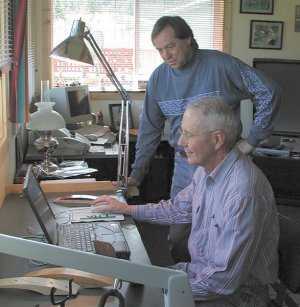 Myron Kirkpatrick and Michael Maslach, of Maslach Designs, working on a pricing model for his handmade guitar and violin hangers (foreground). |
The responsibility of following through, of making the decision, must always rest with the entrepreneur. Not every business idea is viable, and the consequences of poor decisions include bankruptcy, divorce, and death.
Ray Cameron was interested in producing rough-sawn lumber for the agricultural market. A friend told him about Myron. "I was pretty rough about financial and marketing. Myron gave us lots of help, brought up a lot of things that I'd never thought of." Myron helped him develop a pricing model, and encouraged him to find and talk with lumber buyers. "The help we've gotten is great, and the price is right." Ray has decided not to proceed with his idea for the time being, and has confidence that his decision is sound.
Ed Powers, who has an excavating business, was considering elk farming (raising elk under fence so as to market meat and horns). He met with Myron about a dozen times, and they built a spreadsheet model. Ed decided not to proceed. "It looked like a ton of work, it would take time to learn, and I just dropped it." Since then, a tuberculosis scare has put the lid on elk farming in Oregon.
Crystal and Nathan Locke: Chandler's Inn
Crystal and Nathan Locke wanted to buy a bed-and-breakfast in the town of Joseph. "It's hard to survive in Wallowa County. Nathan and I were stressed out, trying to figure out how to make the bed and breakfast work. The only way we could have pulled this off was with Myron. He helped put it all into perspective for us. We learned about each other, how we respond to stress."Peter Donovan 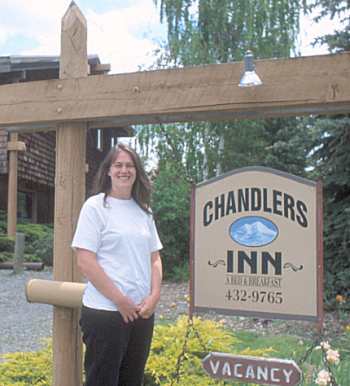 Crystal Locke |
The couple has two young children. "We were spread so thin. Getting focused was so helpful. He coached us step by step--call the insurance, do this, do that. He was committed. No amount of money could have paid for Myron and what he did. Without Myron we wouldn't have been able to have our family together or raise it. He's provided a life for our family. It's been great. Nathan and I have found a balance in our lives."
"I love the advertising, selling a room, and I'm having fun teaching Nathan how to do this." Nathan does the cooking, and Crystal works days as a massage therapist, a job she loves.
Janelle Stewart: Stewart Springs
A recent immigrant from the Washington, D.C. area, Janelle Stewart moved her one-person drafting and design business to Wallowa County because of quality of life issues. Vicki Rosgen, chamber director and board member, suggested she see Myron. To Janelle, "it didn't compute. How could such a service be free, without a bunch of strings attached?" Later she met Myron and made an appointment."I do the product (drafting) and am the minister of propaganda," says Janelle. "We needed financial management help--cash flow, accounting, payroll. Myron's background was in finance, revenue, costs--he made me feel more focused and organized. He gave us the ability to go from just me in the basement, to three employees." Stewart Springs does drafting for steel fabrication--both structural and ornamental, and now occupies a spacious former art gallery in Joseph.
After Myron coached her on the financial side, and on the need to find others to look after this function, her husband Chris now takes more responsibility for finances and they use the services of a local commercial accountant. With Myron's help they have put together a business plan that got them a line of credit at a local bank. "Getting the plan on paper has given me security and confidence, and has validated our existence--this is a business that can be important and viable. Lots of businesses fail as they are not able to center themselves and get that kind of advice."
In partnership with Valley Bronze, this year Stewart Springs landed a $1.2 million contract for work on the World War II memorial in Washington, D.C.
Outlook
Lisa Lang's economic development organization, for supporting BEGIN and WCBF, received the Pioneer Award from the National Association of Development Organizations in 2001. After Ned Webb, the Kansas state economic development director, did onsite visits with BEGIN and WCBF, Kansas is implementing Enterprise Facilitation as a rural development strategy in five areas. "Why didn't I find out about this 20 years ago?" says Webb.Peter Donovan 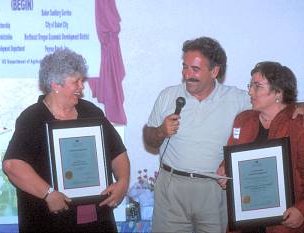 Ruth Townsend, Ernesto Sirolli, and Nancy Peyron at BEGIN's two-year celebration in June 2002. |
Says Lisa Lang, "The major challenges are in keeping the program funded, keeping the board members interested, and making sure we're having the results we need. I've had some frustration that we can't always create the complementary teams, with production, financial management, and marketing that Sirolli talks about. If we can't get these teams in place, we revert to the business advice that we've already had."
Nancy Peyron in Baker concurs. "We have a challenge with teams. The challenge is cultural."
Federal and state funding has mainly been trial or startup funding. Though both projects have proven successes and now run for about $60,000 per year, neither BEGIN nor WCBF has a building or sign, nor do they exist in order to put on public events--making for a recognition problem, according to WCBF board member Catherine Matthias. The need for confidentiality keeps many of the activities out of the public view. These projects depend on newspaper articles, personal contacts, and word-of-mouth.
Author Richard Florida asks, "How do you build a truly creative community--one that can survive and prosper in this emerging age? The key can no longer be found in the usual strategies." These two northeast Oregon counties are developing an answer, but an answer that challenges institutional and organizational habits.
"There are a lot of people with great ideas, but they had no way to carry them through," says Terry Drever-Gee, an entrepreneur and BEGIN board member. "If you really want to make a difference in your community, it has to be grassroots."
Summary and comparison, October 2002
| Baker | Wallowa | |
|---|---|---|
| population, 2000 census | 16,741 | 7,226 |
| Enterprise Facilitation organization, start date | BEGIN (Baker Enterprise Growth Initiative), June 2000 | WCBF (Wallowa County Business Facilitation), January 2001 |
| facilitator | Ruth Townsend | Myron Kirkpatrick |
| entrepreneurs who have had substantive consultations with the facilitator | 345 | 233 |
| new businesses opened | 35 | 11 |
| business expansions or acquisitions completed | 15 | 7 |
| jobs created | 80 (60.5 FTE) | 26 |
| total program cost to date per job created | $2,935 | $6,424 |
| major funders | U.S. Dept. of Agriculture, Oregon Community and Economic Development Dept., U.S. Economic Development Administration, Baker City, Baker County, individuals | U.S. Dept. of Agriculture, Oregon Community and Economic Development Dept., U.S. Economic Development Administration, Wallowa County, cities of Joseph, Enterprise, and Wallowa, Pioneer Bank, Pacificorp, individuals and businesses, Oregon Community Foundation, Verizon |